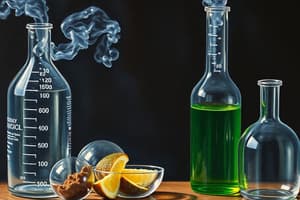Podcast
Questions and Answers
What is the primary focus of Organic Chemistry?
What is the primary focus of Organic Chemistry?
- studying chemical processes in living organisms
- studying physical properties of matter
- studying inorganic compounds
- studying carbon-based compounds and biomolecules (correct)
What is the main use of a Bunsen Burner?
What is the main use of a Bunsen Burner?
heating substances
A balance is used to measure the volume of a liquid.
A balance is used to measure the volume of a liquid.
False (B)
What is the scientific study of the composition, properties, and reactions of matter?
What is the scientific study of the composition, properties, and reactions of matter?
Match the following laboratory equipment with their primary use:
Match the following laboratory equipment with their primary use:
A _______________ is a conical-shaped flask used for titrations and heating substances.
A _______________ is a conical-shaped flask used for titrations and heating substances.
A thermometer is used to measure the mass of substances.
A thermometer is used to measure the mass of substances.
What is the primary use of a Test Tube?
What is the primary use of a Test Tube?
Flashcards are hidden until you start studying
Study Notes
Introduction to Chemistry
- Definition: Chemistry is the scientific study of the composition, properties, and reactions of matter.
- Branches of Chemistry:
- Inorganic Chemistry: study of inorganic compounds (minerals, metals, acids, salts)
- Organic Chemistry: study of organic compounds (carbon-based compounds, biomolecules)
- Physical Chemistry: study of physical properties and reactions of matter
- Analytical Chemistry: study of qualitative and quantitative analysis of matter
- Biochemistry: study of chemical processes in living organisms
Common Laboratory Apparatus and Equipment
Glassware
- Beaker: a cylindrical container used for measuring and mixing substances
- Erlenmeyer Flask: a conical-shaped flask used for titrations and heating substances
- Round-Bottom Flask: a flask with a spherical bottom used for heating and boiling substances
- Test Tube: a small glass tube used for holding small amounts of substances
- Burette: a long, graduated tube used for measuring the volume of a liquid
Measuring and Weighing Equipment
- Balance: an instrument used for measuring the mass of substances
- Pipette: a device used for measuring and transferring precise volumes of liquids
- Burette Stand: a stand used to hold a burette in place
Heating and Cooling Equipment
- Bunsen Burner: a gas burner used for heating substances
- Hot Plate: a device used for heating substances
- Thermometer: an instrument used for measuring temperature
- Ice Bath: a container used for cooling substances
Other Equipment
- Microscope: an instrument used for observing small particles and structures
- Crucible: a container used for heating and melting substances
- Filter Paper: a paper used for separating solid and liquid substances
- Spreader: a tool used for spreading and transferring substances
Note: This is not an exhaustive list of laboratory apparatus and equipment, but it covers some of the most common ones used in a chemistry laboratory.
Introduction to Chemistry
- Chemistry is the scientific study of the composition, properties, and reactions of matter.
- The field of chemistry is divided into five main branches: Inorganic Chemistry, Organic Chemistry, Physical Chemistry, Analytical Chemistry, and Biochemistry.
Branches of Chemistry
- Inorganic Chemistry involves the study of inorganic compounds, including minerals, metals, acids, and salts.
- Organic Chemistry focuses on the study of organic compounds, including carbon-based compounds and biomolecules.
- Physical Chemistry examines the physical properties and reactions of matter.
- Analytical Chemistry deals with the qualitative and quantitative analysis of matter.
- Biochemistry explores the chemical processes that occur in living organisms.
Laboratory Apparatus and Equipment
Glassware
- Beakers are cylindrical containers used for measuring and mixing substances.
- Erlenmeyer Flasks are conical-shaped flasks used for titrations and heating substances.
- Round-Bottom Flasks are flasks with a spherical bottom used for heating and boiling substances.
- Test Tubes are small glass tubes used for holding small amounts of substances.
- Burettes are long, graduated tubes used for measuring the volume of a liquid.
Measuring and Weighing Equipment
- Balances are instruments used for measuring the mass of substances.
- Pipettes are devices used for measuring and transferring precise volumes of liquids.
- Burette Stands are stands used to hold a burette in place.
Heating and Cooling Equipment
- Bunsen Burners are gas burners used for heating substances.
- Hot Plates are devices used for heating substances.
- Thermometers are instruments used for measuring temperature.
- Ice Baths are containers used for cooling substances.
Other Equipment
- Microscopes are instruments used for observing small particles and structures.
- Crucibles are containers used for heating and melting substances.
- Filter Paper is paper used for separating solid and liquid substances.
- Spreader is a tool used for spreading and transferring substances.
Studying That Suits You
Use AI to generate personalized quizzes and flashcards to suit your learning preferences.



